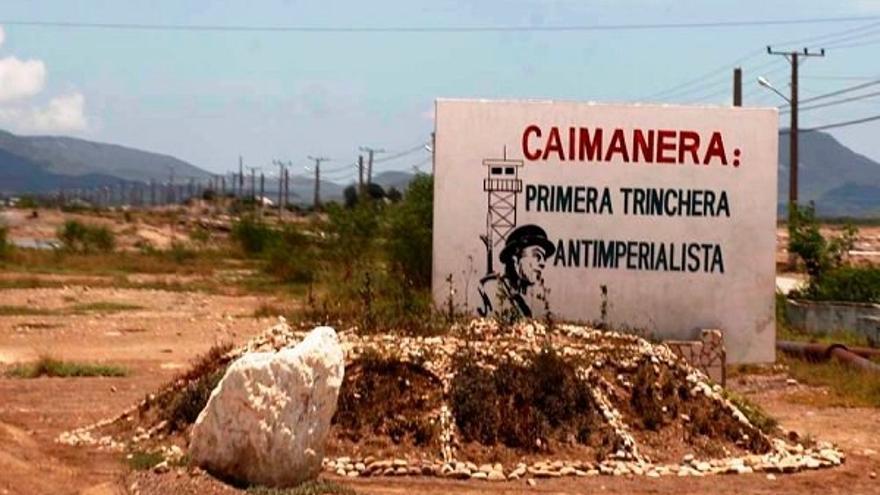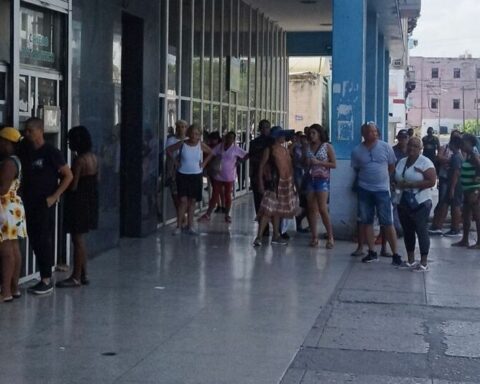The official Cuban press published its version of the protest this Saturday in Caimanera (Guantánamo) after three in the afternoon this Sunday and it is this delay that is mostly reproached by its own readers. Up to now, the note has garnered almost a hundred comments in which a good part of the users ask the authorities for changes and reflection.
Caimanera: What it was and what they tried to make itis the title of the noteoriginally posted by cubadebate and later disseminated by other official media, in which an alternative vision of what happened on Saturday night is presented, when several people who took to the streets to protest shouted slogans against the Communist Party and asked for freedom in that municipality located more than 900 kilometers east of Havana and close to the US Naval Base on the Island.
According to the ruling party, what happened in Caimanera was an “unusual demonstration” of a few dozen people “started by an incident with a small group in a drunken state.” The note then focuses on accusing the “counterrevolution” and “the Miami channels” of taking advantage of the “incident” to “try to give the image of a country in revolt and encourage the unwary to believe it.”
According to the ruling party, what happened in Caimanera was an “unusual demonstration” of a few dozen people “started by an incident with a small group in a drunken state.”
cubadebate stresses that it is part of the “hybrid war” to viralize the images by continually repeating them to “invent uprisings” in other cities, and points to the influencer Alexander Otaola – “the one who aspires to mayor of Miami-Dade” – and the singer La Diosa de Cuba –whom he renames O-goddess– to be at the forefront of events like these.
It also directly accuses the independent media cybercuba to select images of the May Day march, held on Friday, in which few people were seen to project the feeling of little adherence to the Revolution, while the Caimanera protest was considered “multitudinous”, in which no one arrived to a hundred the number of participants, according to the ruling party.
Finally, the note affects the calm that already existed on Sunday in the municipality – where five people were arrested – in the face of violent events that occurred in the US on the same day. “Specific incidents such as those in Caimanera, encouraged by the counterrevolution, in a certainly difficult economic scenario and with latent blackouts, can occur. Any misunderstanding or unsatisfied claim can generate an event, which the enemies of the Revolution will try to capitalize on.” concludes the note before asking the population not to be “confused” by this news.
The readers, mostly close to the editorial line of the medium, support, precisely, in their adherence to the Revolution their reproaches to how the information has been managed. The delay in reacting and, above all, the criticism of the internet outage that followed the protests have been the predominant note, unleashing disputes between the commentators themselves.
“It is not the same to remove a medium from another country for thinking ‘it has false news’, than to remove the internet in the country where you live, to avoid seeing realities. Do you realize it, right?”
“Last night the protest in Caimanera quickly began to circulate on the networks and, for the moment, the internet went down. There was no data, not even a connection through NautaHogar, which caused uncertainty to spread,” protests a user. “Did the internet go down or did they remove the internet? Please, let’s be serious,” replied another, who opens the door to a dispute between those who consider that it is lawful to control the network to prevent “counterrevolutionary” information from circulating or compare it with the interruption of the broadcast of the Russian channels Sputnik and Russia Today in Europe and the US, and those who claim the free use of the networks. “It is not the same to remove a medium, from another country for thinking ‘it has false news’, than to remove the internet in the country where you live, to avoid seeing realities. You do realize, right? I hope so”, another reader intervenes.
Others are more concise, but clearly question the theses of the text. “If there were 3 people bothering, why did they remove the internet from an entire country. You have to be serious.”
“ cubadebate reacted late! Almost 20 hours later. Because? That is why people have to go to other media in search of information. Then it costs more to change the opinion matrix. The lack of immediacy in the news; the old dilemma of Cuban journalism… Why so many congresses and meetings of Upec [Unión de Periodistas de Cuba]?”, joins another who criticizes the times.
The justifications are not lacking, and there are those who consider that “the press in Cuba is neither tabloid nor sensationalist” and needs time to seriously verify information. But not even the most affectionate have just been convinced. “Why do we have to find out things from the mouths of the poisonous ones of cybercuba And the Miami dump? (…). You watch the news and you get the impression that we are in the middle of a heavenly bonanza and we all know that it is not. (:::) If there is a demonstration or a drunken mob that ends in a demonstration, don’t [podemos] wait for the worm that is 5,000 kilometers from here to give us its version of the news and us in Bethlehem with the shepherds”.
“Are we still in a position to continue ignoring the feelings of the people? I do not hide to give my opinion, just as the Constitution gives me that right. Are they still going to continue blaming the blockade for our problems?”
A user who claims to be from Caimanera calls for a strong hand with the “drunkens” who wanted to have their “five minutes of glory” and claims the revolutionary character of the municipality. “Bravo, that is the first anti-imperialist trench, vulgar delinquents paid by the counterrevolution”, cheers another reader.
But unquestioned adherence is rare. Many commentators have asked the authorities to take the opportunity to reflect on why the people are tired. “They need to pay more attention to the problems of the population. We have been having problems buying bread for a month (…) And like that, other things that cause discomfort and irritation,” asks a user. “Are we still in a position to continue ignoring the feelings of the people? I do not hide to give my opinion, just as the Constitution gives me that right. Are they still going to continue blaming the blockade for our problems? Common sense please. Not all of us are illiterate,” claims another.
Despite its attempt to control the story, the government may be concerned when comments like these appear in its media. “They are sticking their heads in the hole like an ostrich. If three drunks are capable of mobilizing dozens of people, as the article says, then there is a problem. And it’s there, you can’t cover the sun with a finger. Curious? So none of the onlookers was a revolutionary militant to persuade the drunks to go home and take a shower?
________________________
Collaborate with our work:
The team of 14ymedio He is committed to doing serious journalism that reflects the reality of deep Cuba. Thank you for accompanying us on this long road. We invite you to continue supporting us, but this time becoming a member of our newspaper. Together we can continue transforming journalism in Cuba.








